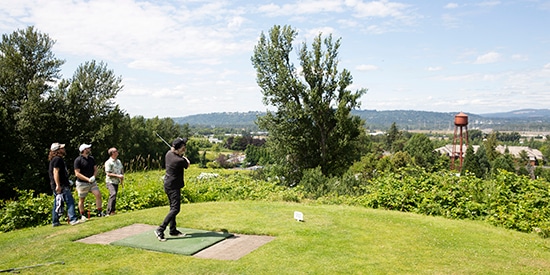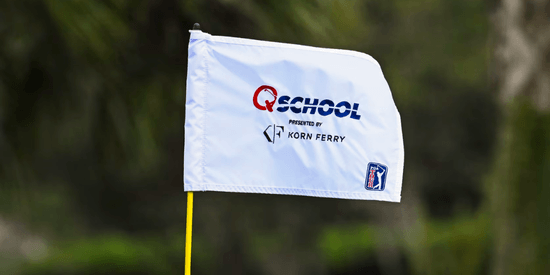Callaway "Golf Lives" feature highlights diversity, passion
10/15/2018 | by AmateurGolf.com Staff
see also: Sponsor News

The Callaway original series "Golf Lives" features three distinctly different golf courses to show how golf brings us together
The people could not look any different, talk any different or tell stories from farther ends of the golf spectrum. There’s a very clear statement at the heart of the three courses and the dozens of individuals who pass through the lens of Callaway’s “Golf Lives: Home Course” features: This game transcends stereotypes. In profiling three starkly different golf cultures across three regions of the United States, Callaway is shedding light on ways we can make the game accessible to people from outside the traditional golf community.
In Washington D.C., it starts with children.
The story of Langston Golf Club, which became the first racially desegregated 18-hole course in Washington D.C. upon its 1939 opening, highlights the efforts made by Boys Institute mentors to introduce the game to boys in the third, fourth and fifth grades.
Ernie Andrews, golf pro educator at Langston, speaks first in the segment.
“Once you learn how to play golf, you’re in the golf family,” Andrews said.
The message of inclusion at Langston is the most heart-warming, and the images of young boys who might not have found their way to a course but for help from people like Greg Jackson Jr., one of the Boys Institute mentors, is powerful.
The stories of Edgefield Golf Course and Wild Horse Golf Course are equally moving, but in a different way. Each profile, like each golf setting, presents a unique vibe communicated by everything from the background music to the images on screen to the voices telling the story.
Edgefield’s is instantly a little rougher. The property in Portland, Ore., is home to a hotel, brewery, winery and two par-3 courses, and it’s far from a proper, stuffy golf scene.
“Edgefield is like, they don’t have rules, they just want you to have fun,” one local notes onscreen, right after a heavy metal intro courtesy of the Portland-based band Red Fang.
“Beers, golf, cheap,” another says, summing it up more succinctly.
The swings aren’t polished in the Edgefield spotlight and neither is the language. But the feeling shared by this group of long-haired, Chuck Taylor-wearing Oregonians is that golf is rad, and it can be enjoyed by someone who has no formal knowledge of or history in the game.
Finally, there is Wild Horse Golf Club in Gothenburg, Neb. Easily the most serene setting profiled by Callaway, Wild Horse is a property built by the hands and equipment of local farmers. It was a community-organized project that began to take shape in the late ‘90s. Now, it’s one of the top public courses in the country.
Many golfers are farmers in this Midwestern town of less than 4,000 people. One of them is Jim Haver, a founding member of Wild Horse who tells the story of borrowing the money, buying the land and finding the equipment to shape pasture ground into a golf course.
“We’d get people together and things just happen,” Haver said as the heavy pages of a scrapbook fall across the screen, revealing the building process.
“This is the only golf course I have ever played that I am happy to play over and over and over again,” Haver said.
In a matter of minutes, “Golf Lives: Home Course” will restore your faith in the game and show you how it can grow.
In Washington D.C., it starts with children.
The story of Langston Golf Club, which became the first racially desegregated 18-hole course in Washington D.C. upon its 1939 opening, highlights the efforts made by Boys Institute mentors to introduce the game to boys in the third, fourth and fifth grades.
Ernie Andrews, golf pro educator at Langston, speaks first in the segment.
“Once you learn how to play golf, you’re in the golf family,” Andrews said.
The message of inclusion at Langston is the most heart-warming, and the images of young boys who might not have found their way to a course but for help from people like Greg Jackson Jr., one of the Boys Institute mentors, is powerful.
The stories of Edgefield Golf Course and Wild Horse Golf Course are equally moving, but in a different way. Each profile, like each golf setting, presents a unique vibe communicated by everything from the background music to the images on screen to the voices telling the story.
Edgefield’s is instantly a little rougher. The property in Portland, Ore., is home to a hotel, brewery, winery and two par-3 courses, and it’s far from a proper, stuffy golf scene.
“Edgefield is like, they don’t have rules, they just want you to have fun,” one local notes onscreen, right after a heavy metal intro courtesy of the Portland-based band Red Fang.
“Beers, golf, cheap,” another says, summing it up more succinctly.
The swings aren’t polished in the Edgefield spotlight and neither is the language. But the feeling shared by this group of long-haired, Chuck Taylor-wearing Oregonians is that golf is rad, and it can be enjoyed by someone who has no formal knowledge of or history in the game.
Finally, there is Wild Horse Golf Club in Gothenburg, Neb. Easily the most serene setting profiled by Callaway, Wild Horse is a property built by the hands and equipment of local farmers. It was a community-organized project that began to take shape in the late ‘90s. Now, it’s one of the top public courses in the country.
Many golfers are farmers in this Midwestern town of less than 4,000 people. One of them is Jim Haver, a founding member of Wild Horse who tells the story of borrowing the money, buying the land and finding the equipment to shape pasture ground into a golf course.
“We’d get people together and things just happen,” Haver said as the heavy pages of a scrapbook fall across the screen, revealing the building process.
“This is the only golf course I have ever played that I am happy to play over and over and over again,” Haver said.
In a matter of minutes, “Golf Lives: Home Course” will restore your faith in the game and show you how it can grow.
Most Popular Articles

2025 PGA TOUR Q-School Guide: Sites, Scores, and Who Advanced
Dec 5, 2025Second Stage is complete and Final Stage awaits at Sawgrass — follow every Q-School leaderboard and the players still chasing
2025 LPGA TOUR Q-Series: Final Qualifying Stage FINAL SCORING
Dec 8, 2025Helen Briem earns medalist honors, 31 players headed to the LPGA next year
Australian Open at Royal Melbourne: Preview, amateur bios, and how to watch
Nov 30, 2025Rory McIlroy headlines one of the championship's top fields in years - at least four amateurs will have their chance at glory
Luke Ringkamp Cruises to Rolex Tournament of Champions Title at TPC San Antonio
Nov 26, 2025One week after committing to Pepperdine, Luke Ringkamp won the Rolex Tournament of Champions by nine shots.Inside Gil Hanse’s Restoration of Baltusrol’s Upper Course: A Return to Tillinghast’s
Dec 11, 2025Renowned architect Gil Hanse reveals how he brought Baltusrol’s Upper Course back to life by honoring A.W. Tillinghast’s originalLoading latest news...
